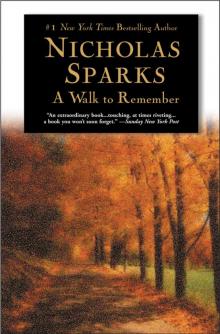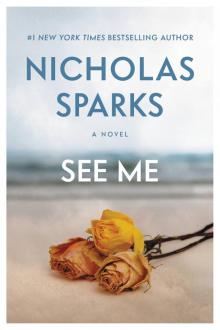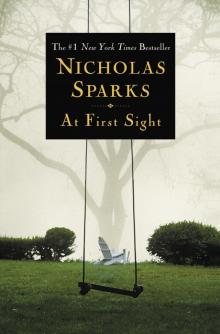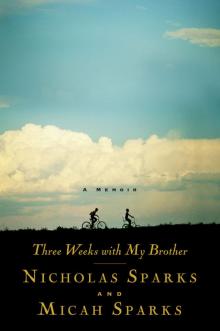- Home
- Nicholas Sparks
Nights in Rodanthe
Nights in Rodanthe Read online
PRAISE FOR
Nights in Rodanthe
AND #1 NEW YORK TIMES BESTSELLING AUTHOR
NICHOLAS SPARKS
"Extremely hard to put down... a love story and a good love story at that."
--Boston Herald
"The master of the love story genre... vivid characters... He's also adept at bringing a background to life."
--Amarillo Globe-News
"Worth spending a night with."
--People
"A page-turner."
--Connecticut Post
"With immeasurable intensity and precision... Sparks is once again exploring the mysterious ways of the heart."
--Writer's Digest
A Bend in the Road
"Sweet, accessible, uplifting... expect instant bestsellerdom."
--Publishers Weekly
"A powerful tale of true love."
--Booklist
"A charming and thoughtful love story... Don't miss it; this is a book that's light on the surface but with subtle depths."
--BookLoons.com
"A moving story. Nicholas Sparks fans will love it."
--TheBookHaven.net
The Rescue
"A modern master of fateful love stories."
--BookPage
"A romantic page-turner... Sparks's fans won't be disappointed."
--Glamour magazine
"All of Sparks's trademark elements--love, loss, and small-town life--are present in this terrific read."
--Booklist
A Walk to Remember
"An extraordinary book... touching, at times riveting... a book you won't soon forget."
--Sunday New York Post
"A sweet tale of young but everlasting love."
--Chicago Sun-Times
"Bittersweet... a tragic yet spiritual love story."
--Variety
"Sparks proves once again that he is a master at pulling heartstrings... it will enthrall Sparks's numerous fans."
--Booklist
Message in a Bottle
"The novel's unabashed emotion--and an unexpected turn--will put tears in your eyes."
--People
"Glows with moments of tenderness... has the potential to delve deeply into the mysteries of eternal love."
--Cleveland Plain Dealer
"Deeply moving, beautifully written, and extremely romantic."
--Booklist
"Brew the tea or pour a glass of wine--whatever is your pleasure. And settle in... you're in for another treat."
--Oakland Press
The Notebook
"Nicholas Sparks... will not let you go. His novel shines."
--Dallas Morning News
"Proves that good things come in small packages... a classic tale of love."
--Christian Science Monitor
"The lyrical beauty of this touching love story... will captivate the heart of every reader... and establish Nicholas Sparks as a gifted novelist."
--Denver Rocky Mountain News
Also by Nicholas Sparks
The Notebook
Message in a Bottle
A Walk to Remember
The Rescue
A Bend in the Road
The Guardian
The Wedding
Three Weeks with My Brother (with Micah Sparks)
True Believer
At First Sight
Dear John
The Choice
Copyright
This book is a work of fiction. Names, characters, places, and incidents are the product of the author's imagination or are used fictitiously. Any resemblance to actual events, locales, or persons, living or dead, is coincidental.
Copyright (c) 2002 by Nicholas Sparks All rights reserved. Except as permitted under the U.S. Copyright Act of 1976, no part of this publication may be reproduced, distributed, or transmitted in any form or by any means, or stored in a database or retrieval system, without the prior written permission of the publisher.
Grand Central Publishing Hachette Book Group
237 Park Avenue
New York, NY 10017
Visit our website at www.HachetteBookGroup.com.
Originally published in hardcover by Hachette Book Group USA.
First eBook Edition: September 2002
Grand Central Publishing is a division of Hachette Book Group, Inc.
The Grand Central Publishing name and logo is a trademark of Hachette Book Group, Inc.
ISBN: 978-0-7595-2728-7
Contents
Praise for Nights in Rodanthe
Also by Nicholas Sparks
Copyright
Acknowledgments
Chapter One
Chapter Two
Chapter Three
Chapter Four
Chapter Five
Chapter Six
Chapter Seven
Chapter Eight
Chapter Nine
Chapter Ten
Chapter Eleven
Chapter Twelve
Chapter Thirteen
Chapter Fourteen
Chapter Fifteen
Chapter Sixteen
Chapter Seventeen
Chapter Eighteen
Chapter Nineteen
For Landon, Lexie, and Savannah
Acknowledgments
Nights in Rodanthe, as with all my novels, couldn't have been written without the patience, love, and support of my wife, Cathy. She only gets more beautiful every year.
Since the dedication is to my other three children, I have to acknowledge both Miles and Ryan (who got a dedication in Message in a Bottle). I love you guys!
I'd also like to thank Theresa Park and Jamie Raab, my agent and editor respectively. Not only do they both have wonderful instincts, but they never let me slide when it comes to my writing. Though I sometimes grumble about the challenges this presents, the final product is what it is because of those two. If they like the story, odds are that you will, too.
Larry Kirshbaum and Maureen Egen at Warner Books also deserve my thanks. When I go to New York, spending time with them is like visiting with my family. They've made Warner Books a wonderful home for me.
Denise Di Novi, the producer of both Message in a Bottle and A Walk to Remember, is not only skilled at what she does, but someone I trust and respect. She's a good friend, and she deserves my thanks for all she has done--and still does--for me.
Richard Green and Howie Sanders, my agents in Hollywood, are great friends, great people, and great at what they do. Thanks, guys.
Scott Schwimer, my attorney and friend, always watches out for me. Thank you.
In publicity, I have to thank Jennifer Romanello, Emi Battaglia, and Edna Farley; Flag and the rest of the cover design people; Courtenay Valenti and Lorenzo De Bonaventura of Warner Bros.; Hunt Lowry and Ed Gaylord II, of Gaylord Films; Mark Johnson and Lynn Harris of New Line Cinema; they have all been great to work with. Thanks, everyone.
Mandy Moore and Shane West were both wonderful in A Walk to Remember, and I appreciate their enthusiasm for the project.
Then there is family (who might get a kick out of seeing their names here): Micah, Christine, Alli, and Peyton; Bob, Debbie, Cody, and Cole; Mike and Parnell; Henrietta, Charles, and Glenara; Duke and Marge; Dianne and John; Monte and Gail; Dan and Sandy; Jack, Carlin, Joe, Elaine, and Mark; Michelle and Lemont; Paul, John, and Caroline; Tim, Joannie, and Papa Paul.
And, of course, how can I forget Paul and Adrienne?
One
Three years earlier, on a warm November morning in 1999, Adrienne Willis had returned to the Inn and at first glance had thought it unchanged, as if the small Inn were impervious to sun and sand and salted mist. The porch had been freshly painted, and shiny black s
hutters sandwiched rectangular white-curtained windows on both floors like offset piano keys. The cedar siding was the color of dusty snow. On either side of the building, sea oats waved a greeting, and sand formed a curving dune that changed imperceptibly with each passing day as individual grains shifted from one spot to the next.
With the sun hovering among the clouds, the air had a luminescent quality, as though particles of light were suspended in the haze, and for a moment Adrienne felt she'd traveled back in time. But looking closer, she gradually began to notice changes that cosmetic work couldn't hide: decay at the corners of the windows, lines of rust along the roof, water stains near the gutters. The Inn seemed to be winding down, and though she knew there was nothing she could do to change it, Adrienne remembered closing her eyes, as if to magically blink it back to what it had once been.
Now, standing in the kitchen of her own home a few months into her sixtieth year, Adrienne hung up the phone after speaking with her daughter. She sat at the table, reflecting on that last visit to the Inn, remembering the long weekend she'd once spent there. Despite all that had happened in the years that had passed since then, Adrienne still held tight to the belief that love was the essence of a full and wonderful life.
Outside, rain was falling. Listening to the gentle tapping against the glass, she was thankful for its steady sense of familiarity. Remembering those days always aroused a mixture of emotions in her--something akin to, but not quite, nostalgia. Nostalgia was often romanticized; with these memories, there was no reason to make them any more romantic than they already were. Nor did she share these memories with others. They were hers, and over the years, she'd come to view them as a sort of museum exhibit, one in which she was both the curator and the only patron. And in an odd way, Adrienne had come to believe that she'd learned more in those five days than she had in all the years before or after.
She was alone in the house. Her children were grown, her father had passed away in 1996, and she'd been divorced from Jack for seventeen years now. Though her sons sometimes urged her to find someone to spend her remaining years with, Adrienne had no desire to do so. It wasn't that she was wary of men; on the contrary, even now she occasionally found her eyes drawn to younger men in the supermarket. Since they were sometimes only a few years older than her own children, she was curious about what they would think if they noticed her staring at them. Would they dismiss her out of hand? Or would they smile back at her, finding her interest charming? She wasn't sure. Nor did she know if it was possible for them to look past the graying hair and wrinkles and see the woman she used to be.
Not that she regretted being older. People nowadays talked incessantly about the glories of youth, but Adrienne had no desire to be young again. Middle-aged, maybe, but not young. True, she missed some things--bounding up the stairs, carrying more than one bag of groceries at a time, or having the energy to keep up with the grandchildren as they raced around the yard--but she'd gladly exchange them for the experiences she'd had, and those came only with age. It was the fact that she could look back on life and realize she wouldn't have changed much at all that made sleep come easy these days.
Besides, youth had its problems. Not only did she remember them from her own life, but she'd watched her children as they'd struggled through the angst of adolescence and the uncertainty and chaos of their early twenties. Even though two of them were now in their thirties and one was almost there, she sometimes wondered when motherhood would become less than a full-time job.
Matt was thirty-two, Amanda was thirty-one, and Dan had just turned twenty-nine. They'd all gone to college, and she was proud of that, since there'd been a time when she wasn't sure any of them would. They were honest, kind, and self-sufficient, and for the most part, that was all she'd ever wanted for them. Matt worked as an accountant, Dan was the sportscaster on the evening news out in Greenville, and both were married with families of their own. When they'd come over for Thanksgiving, she remembered sitting off to the side and watching them scurry after their children, feeling strangely satisfied at the way everything had turned out for her sons.
As always, things were a little more complicated for her daughter.
The kids were fourteen, thirteen, and eleven when Jack moved out of the house, and each child had dealt with the divorce in a different way. Matt and Dan took out their aggression on the athletic fields and by occasionally acting up in school, but Amanda had been the most affected. As the middle child sandwiched between brothers, she'd always been the most sensitive, and as a teenager, she'd needed her father in the house, if only to distract from the worried stares of her mother. She began dressing in what Adrienne considered rags, hung with a crowd that stayed out late, and swore she was deeply in love with at least a dozen different boys over the next couple of years. After school, she spent hours in her room listening to music that made the walls vibrate, ignoring her mother's calls for dinner. There were periods when she would barely speak to her mother or brothers for days.
It took a few years, but Amanda had eventually found her way, settling into a life that felt strangely similar to what Adrienne once had. She met Brent in college, and they married after graduation and had two kids in the first few years of marriage. Like many young couples, they struggled financially, but Brent was prudent in a way that Jack never had been. As soon as their first child was born, he bought life insurance as a precaution, though neither expected that they would need it for a long, long time.
They were wrong.
Brent had been gone for eight months now, the victim of a virulent strain of testicular cancer. Adrienne had watched Amanda sink into a deep depression, and yesterday afternoon, when she dropped off the grandchildren after spending some time with them, she found the drapes at their house drawn, the porch light still on, and Amanda sitting in the living room in her bathrobe with the same vacant expression she'd worn on the day of the funeral.
It was then, while standing in Amanda's living room, that Adrienne knew it was time to tell her daughter about the past.
Fourteen years. That's how long it had been.
In all those years, Adrienne had told only one person about what had happened, but her father had died with the secret, unable to tell anyone even if he'd wanted to.
Her mother had passed away when Adrienne was thirty-five, and though they'd had a good relationship, she'd always been closest to her father. He was, she still thought, one of two men who'd ever really understood her, and she missed him now that he was gone. His life had been typical of so many of his generation. Having learned a trade instead of going to college, he'd spent forty years in a furniture manufacturing plant working for an hourly wage that increased by pennies each January. He wore fedoras even during the warm summer months, carried his lunch in a box with squeaky hinges, and left the house promptly at six forty-five every morning to walk the mile and a half to work.
In the evenings after dinner, he wore a cardigan sweater and long-sleeved shirts. His wrinkled pants lent a disheveled air to his appearance that grew more pronounced as the years wore on, especially after the passing of his wife. He liked to sit in the easy chair with the yellow lamp glowing beside him, reading genre westerns and books about World War II. In the final years before his strokes, his old-fashioned spectacles, bushy eyebrows, and deeply lined face made him look more like a retired college professor than the blue-collar worker he had been.
There was a peacefulness about her father that she'd always yearned to emulate. He would have made a good priest or minister, she'd often thought, and people who met him for the first time usually walked away with the impression that he was at peace with himself and the world. He was a gifted listener; with his chin resting in his hand, he never let his gaze stray from people's faces as they spoke, his expression mirroring empathy and patience, humor and sadness. Adrienne wished that he were around for Amanda right now; he, too, had lost a spouse, and she thought Amanda would listen to him, if only because he knew how hard it really was.
&nb
sp; A month ago, when Adrienne had gently tried to talk to Amanda about what she was going through, Amanda had stood up from the table with an angry shake of her head.
"This isn't like you and Dad," she'd said. "You two couldn't work out your problems, so you divorced. But I loved Brent. I'll always love Brent, and I lost him. You don't know what it's like to live through something like that."
Adrienne had said nothing, but when Amanda left the room, Adrienne had lowered her head and whispered a single word.
Rodanthe.
While Adrienne sympathized with her daughter, she was concerned about Amanda's children. Max was six, Greg was four, and in the past eight months, Adrienne had noticed distinct changes in their personalities. Both had become unusually withdrawn and quiet. Neither had played soccer in the fall, and though Max was doing well in kindergarten, he cried every morning before he had to go. Greg had started to wet the bed again and would fly into tantrums at the slightest provocation. Some of these changes stemmed from the loss of their father, Adrienne knew, but they also reflected the person that Amanda had become since last spring.
Because of the insurance, Amanda didn't have to work. Nonetheless, for the first couple of months after Brent had died, Adrienne spent nearly every day at their house, keeping the bills in order and preparing meals for the children, while Amanda slept and wept in her room. She held her daughter whenever Amanda needed it, listened when Amanda wanted to talk, and forced her daughter to spend at least an hour or two outside each day, in the belief that fresh air would remind her daughter that she could begin anew.
Adrienne had thought her daughter was getting better. By early summer, Amanda had begun to smile again, infrequently at first, then a little more often. She ventured out into the town a few times, took the kids roller-skating, and Adrienne gradually began pulling back from the duties she was shouldering. It was important, she knew, for Amanda to resume responsibility for her own life again. Comfort could be found in the steady routines of life, Adrienne had learned; she hoped that by decreasing her presence in her daughter's life, Amanda would be forced to realize that, too.
But in August, on the day that would have been her seventh wedding anniversary, Amanda opened the closet door in the master bedroom, saw dust collecting on the shoulders of Brent's suits, and suddenly stopped improving. She didn't exactly regress--there were still moments when she seemed her old self--but for the most part, she seemed to be frozen somewhere in between. She was neither depressed nor happy, neither excited nor languid, neither interested nor bored by anything around her. To Adrienne, it seemed as if Amanda had become convinced that moving forward would somehow tarnish her memories of Brent, and she'd made the decision not to allow that to happen.

 The Notebook
The Notebook Two by Two
Two by Two A Walk to Remember
A Walk to Remember The Guardian
The Guardian Dear John
Dear John The Last Song
The Last Song The Lucky One
The Lucky One The Wedding
The Wedding The Longest Ride
The Longest Ride Safe Haven
Safe Haven The Rescue
The Rescue The Wish
The Wish See Me
See Me Message in a Bottle
Message in a Bottle At First Sight
At First Sight True Believer
True Believer The Return
The Return A Bend in the Road
A Bend in the Road Three Weeks With My Brother
Three Weeks With My Brother Nights in Rodanthe
Nights in Rodanthe Every Breath
Every Breath